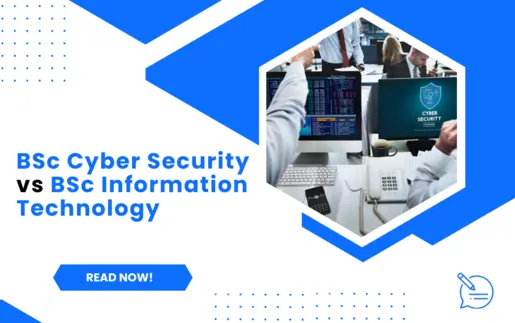Revealing the IT Universe: BSc Information Technology
In today's technologically advanced world, there is a greater than ever need for qualified IT experts. The demand for people with knowledge of Information Technology (IT) has never been greater as organizations and industries continue to digitize and rely on cutting-edge solutions. Getting a BSc Information Technology (BSc IT) can lead to a variety of fascinating opportunities. The BSc IT course, its contents, syllabus, and prospective pay prospects will all be covered in this blog.

What is BSc IT ?
A BSc Information Technology is an undergraduate degree program created to give students in-depth knowledge and practical abilities in a variety of information technology-related areas. This course aims to produce people who can effectively handle complex IT problems in the real world. The course material includes a wide range of subjects, such as web development, database management, networking, programming, and more.
Course topics and the syllabus:
Core subjects and electives are often included in the BSc IT degree, allowing students to focus on their areas of interest. While specific studies may differ amongst universities, the essential subjects covered by the syllabus are generally the same.
Programming Languages: C++, Java, Python, and other programming languages are among those that are covered in this course's introduction to programming. It provides the structure for creating software and resolving issues.
Database management systems: (DBMS) are systems that organize, store, retrieve, and manage data. Students study SQL and other vital database technologies.
Computer networks, network protocols, and network security measures are all covered under the heading of networking and security. It gives students the knowledge and abilities to create and manage secure network infrastructures.
Web development: Students are taught web technologies including HTML, CSS, JavaScript, and frameworks to help them build engaging websites.
Operating Systems: Students study several operating systems, including Windows, Linux, and macOS, and get an understanding of their administration and capabilities.
Software Engineering: The principles and practices of software development, project management, and quality assurance are all covered in depth in the course of study known as "software engineering."
Artificial Intelligence: Data analytics and artificial intelligence (AI): Students enrolled in BSc IT courses learn about AI principles, machine learning techniques, and data processing and analysis tools.
Mobile App Development: Using the distinct difficulties of mobile environments, this course helps students to plan and create mobile applications for various platforms.
Career Opportunities and Salary:
In this field students have a bright and good future scope of BSc IT . Students who have a degree are qualified to fill a variety of positions in the IT sector. They can work as IT consultants, network engineers, database administrators, web developers, cybersecurity analysts, and software developers, among other positions.
The acquiring possibilities for alumni of BSc IT degrees are awesome. The area of the work, the size of the business, the individual's degree of involvement, and the particular pretense can all influence how much a representative is paid truly. As a new alumni, one would expect to procure a serious beginning compensation with experience and specialization. Early-vocation compensation could go from $50,000 to $70,000 each year. Experts that work in their professions and gain aptitude might acquire essentially more than $100,000 yearly.
Eligibility & Admission Requirements for B.Sc. IT
Admission requirements for the B.Sc. IT degree: Candidates for B.Sc. IT (Bachelor of Science in Information Technology) admission must have finished their upper secondary education (10+2) or its equivalent with a minimum aggregate score of 50% in pertinent disciplines including Mathematics, Physics, and Computer Science. It means BSc IT eligibility is 10+2 with non medical and with computer science. B.Sc IT Admission programs are often merit-based, taking into account the candidate's academic achievement on the prerequisite tests. Entrance exams may also be used to choose students by some institutions or colleges. Applicants can submit their applications directly to the relevant educational institutions during the admissions season by meeting the stipulated requirements and submitting the necessary paperwork.
There are numerous colleges in Chandigarh ( Punjab) but Chandigarh Group of Colleges Jhanjeri is the best college for BSc IT in Punjab. This institute is providing world class faculty and it has partnership with foreign universities.Admissions open at CGC Jhanjeri.
A BSc Information Technology certificate gives understudies a drawing in prologue to the field of data innovation and furnishes them with the information and abilities they need for a unique field. With an emphasis on viable information and genuine experience, graduates are exceptional to flourish in the cutthroat business market.
If you are enthusiastic about innovation and need to have an effect in the computerized world, a BSc in It very well may be the best initial move toward a satisfying and fruitful vocation. Open up the universe of IT and make the most of the many possibilities that the BSc IT degree gives!
Frequently Asked Questions
Q: What is the Data Innovation (BSc IT) degree?
A: The investigation of a few areas of data innovation, including programming improvement, data set organization, systems administration, and PC equipment, is the subject of the three year certification in scientific studies in Data Innovation (BSc IT) college degree program.
Q: What subjects are as often as possible included for BSc IT courses?
A: The BSc IT course educational program frequently covers the accompanying subjects:
- Program programming dialects like Java, Python, and C++
- Information designs and coding techniques
- Information base administration frameworks
- Electronic organizations
- PC applications
- Innovation utilized in sites (HTML, CSS, JavaScript)
- Investigation into programming
- The improvement of portable applications
- Network safety
- Using man-made reasoning and innovation to learn
- Man-made reasoning and AI
Q: Can you give a summary of the BSc IT course syllabus
A: The BSc IT curriculum is created to give students a thorough understanding of information technology ideas and practical skills. The curriculum may vary based on the university, however it often includes the disciplines indicated in the previous question. In accordance with their interests and career objectives, students can also select their particular syllabus according to their interest.
Q: What are the opportunities for employment after earning a BSc in IT?
A: Graduates with a BSc Information Technology can investigate a number of employment options in the field, including:
- Developer of software
- Web Developer Database Administrator & Network Administrator
- IT consultant System Analyst
- Cybersecurity Expert
- IT project manager and mobile application developer
Q: What are my employment prospects after receiving a BSc in IT?
A: Graduates with a BSc in IT may look into a range of job opportunities, including:
- Creating Software
- Web Programmer Administrator of Databases, Network Administrators, System Analysts, Cybersecurity Experts, Project Managers, and Creators of Mobile Applications



















